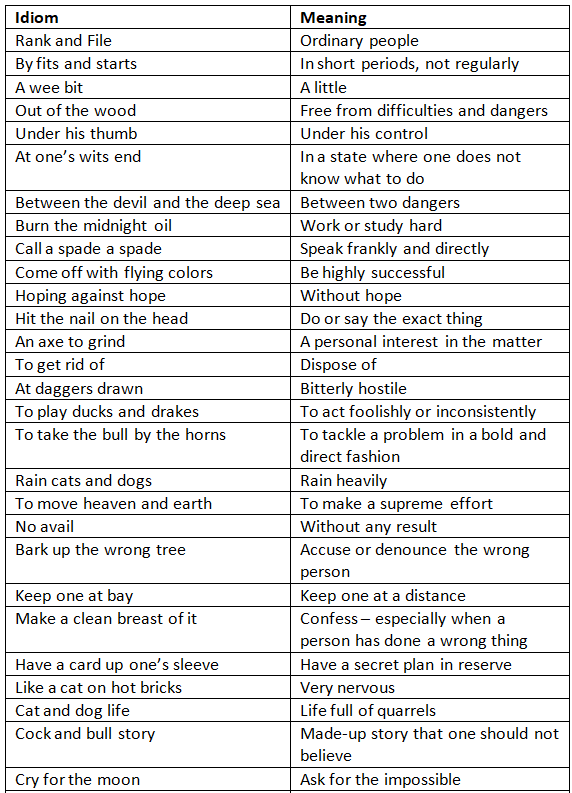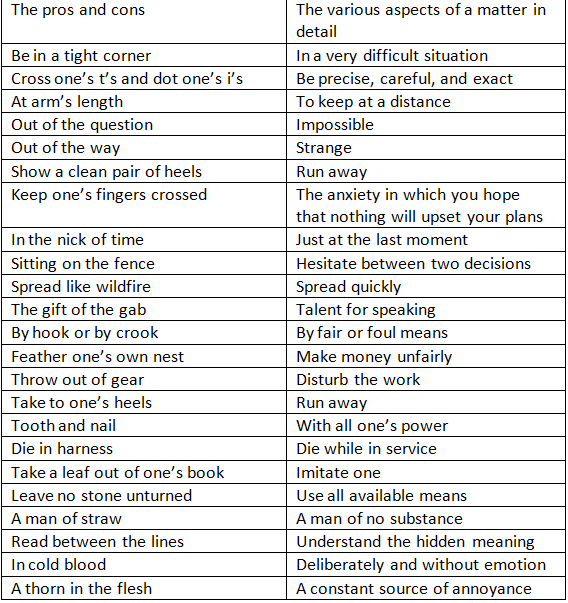Idioms and Phrases: Rules and Examples | English Language & Comprehension for Competitive Exams - SSC MTS / SSC GD PDF Download
Idioms and phrases are common expressions in English that have meanings different from the literal meanings of the words. They are often used in everyday conversations and writing to make language more colorful and interesting. Understanding idioms helps in better communication and allows us to express ideas in a more creative way. Learning these expressions can improve both speaking and writing skills, especially in exams and real-life situations.

What is an Idiom?

An idiom is a phrase or expression whose meaning is different from the literal interpretation of the individual words. It is a commonly used expression that has a figurative meaning, often specific to a particular language or culture. For example, "kick the bucket" means "to die," which is not related to the literal act of kicking a bucket.
Examples of Idioms
- Break the ice: To start a conversation in a social setting or ease tension.
- Bite the bullet: To do something painful or difficult that is unavoidable.
- Hit the nail on the head: To describe exactly what is causing a situation or problem.
- Under the weather: To feel sick or unwell.
- Piece of cake: Something that is very easy to do.
What are Phrases?

A phrase is a group of words that work together to convey a specific meaning but does not form a complete sentence on its own. Unlike idioms, phrases may not always have a figurative meaning and can be literal. Phrases are used to add detail, description, or context to communication. Examples include "on the table," "in the morning," or "by the way." They are an essential part of sentence construction and can be composed of nouns, verbs, adjectives, or other parts of speech.
There are different types of Phrases in the English language:
- Noun Phrase: A group of words that consists of nouns and any modifiers.
- Verb Phrase: A group of words that consists of nouns and modifiers.
- Prepositional Phrase: A group of words that begins with a preposition and helps to explain the relationship between two things.
Examples of Phrases
- On the table: Referring to something that is physically placed on a table.
- In the morning: Referring to a time period during the early part of the day.
- By the way: A phrase used to introduce an additional thought or topic.
- At the end: Referring to the conclusion or final part of something.
- In charge of: Having control or responsibility for something.
Rules for Idioms and Phrases
- Idioms and Phrases are literal terms that induce a meaning that may be otherwise hidden behind the actual words.
- They have a cultural value attached to themselves.
- They are metaphorical in the sense that if you extract the literal meaning of all the words stated then it would be too unusual to believe or even farcical.
- Idioms and phrases have the capacity to add a flavor to a boring prose or book and are used by authors to add something interesting or remove monotones from their writing.
- While reading and answering Idioms and Phrases we can say that there is a slight difference in the two.
Differences between Idioms and Phrases
The main difference between idioms and phrases lies in understanding their meanings:
- Idioms make sense on their own, whereas phrases make sense when incorporated into a sentence.
- Idioms are commonly used as slang or part of spoken language, while phrases are used in regular sentences.
- For idioms, we interpret their symbolic meaning, while for phrases, we take their literal meaning.
- An idiom can be a single word, but phrases are generally not single words.
- An idiom can be a phrase; if a phrase has a metaphorical meaning, it is considered an idiom.
Important Tricks to Remember Idiom and Phrases
- Start by creating flashcards, either physical or digital, where you write down the idiom, its meaning, and an example sentence. This allows for quick revision and frequent practice.
- Organize idioms into categories based on common themes, such as success, failure, or relationships. This will help with understanding and retention.
- Get creative by making up stories or jokes that include idioms, as this will make them more memorable. Practice using idioms in your own sentences to become comfortable with their usage.
- Engage with idioms in real-life situations, such as through social media posts and comments, to reinforce their meaning and application.
- Try learning the opposite meanings of idioms when possible. This contrasting information helps strengthen your memory of both the idioms and their meanings.
By using these varied techniques, you can build a strong foundation in idioms and phrases for the SSC exam.
List of Some Common Idioms and Phrases


|
81 videos|60 docs|48 tests
|
















